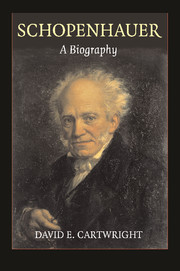Book contents
- Frontmatter
- Contents
- Preface
- Acknowledgments
- Notes on the Text
- Chronology of Schopenhauer's Life and Works
- 1 The Affirmation of the Will
- 2 A Tour for a Trade
- 3 A Father's Death; A Philosopher's Birth
- 4 The University Years
- 5 The Better Consciousness, Causes, Grounds, and Confrontations
- 6 Goethe, Colors, and Eastern Lights
- 7 The Single Thought of Dresden
- 8 Failure in Berlin
- 9 Ich Bin Kein Berliner
- 10 The Frankfurt Philosopher
- 11 The Dawn of Fame and the End of Life
- Works Cited
- Index
3 - A Father's Death; A Philosopher's Birth
Published online by Cambridge University Press: 05 April 2014
- Frontmatter
- Contents
- Preface
- Acknowledgments
- Notes on the Text
- Chronology of Schopenhauer's Life and Works
- 1 The Affirmation of the Will
- 2 A Tour for a Trade
- 3 A Father's Death; A Philosopher's Birth
- 4 The University Years
- 5 The Better Consciousness, Causes, Grounds, and Confrontations
- 6 Goethe, Colors, and Eastern Lights
- 7 The Single Thought of Dresden
- 8 Failure in Berlin
- 9 Ich Bin Kein Berliner
- 10 The Frankfurt Philosopher
- 11 The Dawn of Fame and the End of Life
- Works Cited
- Index
Summary
From berlin, heinrich floris returned to Hamburg, and Johanna and Arthur went to Danzig, where they would stay for three months. While in Danzig, Johanna retrieved Adele, visited her family, and was entertained by her friends. Arthur went to Danzig to be confirmed, to suffer the dire consequences of his self-defeating decision of selecting the European pleasure tour over his deeper desire to become a scholar, and to once again receive the same sort of tedious and carping letters from a distant father. Indeed, his father's letters to Danzig were almost carbon copies of those Arthur received during his three-month sentence at Wimbledon School. No matter what Arthur promised about living up to his father's expectations, nor what good reports he received about his son, Heinrich Floris found a way to find fault. Thus he wrote Arthur about his mother's report that he had become a fine young gentleman, and her remark about how others had commented on his orderly behavior, but he used this only to make yet another demand: “let this orderliness also prevail in your room and luggage, because that event in Braunau was very annoying.” In response to yet another of his son's promises to improve his writing and calculating skills, instead of encouraging him to do so, he demanded that he walk erect, “like other people do, so that you will not get round shoulders, which look horrible. Good posture at the stand-up writing-desk is equally important as it is in everyday life; since if, when dining out, one observes another sitting with a bent back, one assumes him to be a cobbler or a tailor in disguise.”
- Type
- Chapter
- Information
- SchopenhauerA Biography, pp. 85 - 136Publisher: Cambridge University PressPrint publication year: 2010



